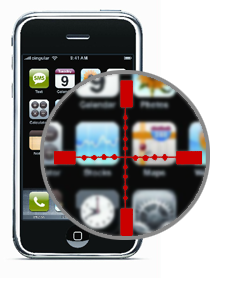The Long Game

The coverage of the mobile space for the past several years has been entertaining to watch, especially where pundits declared devices from various manufacturers as sure-fire iPhone 'killers' (the wishy-washy ones appending a question mark to the phrase). Initially the focus was on spec sheets and touchscreens, the thinking seemed to be that a touchscreen was all that was missing from the iPhone's competitors. It didn't seem like these writers understood that the touchscreen, or any one particular feature, is not what makes the iPhone great..
As each would-be iPhone challenger is defeated by the incumbent, the tech press is shifting to the position that the iPhone is somehow unassailable. Robert Scoble, sparked a discussion about how the applications available on the iPhone insulate it from being disrupted. Applications do create a huge barrier for competitors, but only in the short term.
Apple is winning the handset battles but I believe it's ultimately going to lose the handset war. We are witnessing a replay of the desktop operating system wars of days past, a new "pirates of silicon valley". In this round, Google will be playing the part of Microsoft, and Apple will be playing, well, Apple.
Apple has created an elegant, integrated, computing experience. Its applications and functionality are superior in most ways to its competitors. This integrated experience has introduced millions of people to tremendous computing power in a much more accessible way. It is, however, a closed platform with a single hardware and OS provider. This has traditionally been the source of Apple's greatest strength but ironically, it is also its Achilles heel. The parallels to the Macintosh computer are almost eerie.
Now an upstart competitor has appeared aimed straight at the intrinsic weakness in Apple's product and philosophy. Google seems to be taking the Microsoft playbook from history, working furiously towards 'good enough' user experience. Android has invariably been described as clunky, not as slick, and not as functional as the iPhone. Making the software free, however, will allow thousands of hardware manufacturers to rapidly iterate on features and, most importantly, cost. The historical parallels to Windows PC's is again eerie.
As more handset makers begin bundling Android with their devices, the cost for an Android-based smartphone is going to approach zero (especially with carrier incentives). Android will become the equivalent of Windows 3.0, clunky but "functional enough". Its cost, though, will allow it to become ubiquitous.
I started writing this post yesterday, and today I see MG Siegler has written a post where he also describes this historical similarity, but comes to a distinctly different conclusion, that the tight integration and control will keep users on the iPhone. I think he's missing the long game.
Google is banking on the unshakable core philosophy of Apple, and the power of market forces to eventually win the war, just as Microsoft eventually won the desktop OS war. While the tight integration and user experience will keep users on the iPhone in the short term, there will come a time when the price performance curve reaches the 'good enough' plateau. Sure there will be instability, market confusion, clunky interfaces, clunky applications, but Android will have one huge point in its favor, a trump card, it will be cheap.
What about the point that Scoble brought up regarding applications? This is the interesting part of the Google strategy. When billions of free handsets are given away running Android, which platform will developers create for? Sure it will be less elegant, less integrated, have more headaches (I even suspect some form of the 'blue screen of death' will appear on Android) but developers will be willing to work through all the issues. Just as in the Macintosh vs. Windows war, the deciding factor for developers will ultimately be market share and the potential user base.
Will this happen tomorrow? Will there be a single iPhone killer? I don't think so. This will occur over a period of time when Android becomes the 'default' OS for all handsets. It will steadily progress, improving on each iteration just as Windows moved from being awkward and clunky (windows 1.0-3.0) to a real usable and almost elegant system (95, XP, windows 7).
Surely Apple knows its own history better than anyone, so it will have worked out ways to prevent this same fate from occurring, right? I'm not so sure. Just as I said before, the tight control and integration of Apple's products is its greatest strength. It also seems to be a core pillar of the company's philosophy. I think it will be nearly impossible for Apple to address this Achilles heel without spoiling its great success. Again looking to history, people have often said Apple should have licensed its software, the problem is, by doing that you destroy what makes Apple's products great. It will be interesting to watch how this unfolds, and if, Apple has learned some market jujitsu to avoid the fate of the Macintosh for its new platform.
I think the eventual iPhone killer will be what makes the iPhone (and historically the Macintosh) great, the tightly controlled user experience. There will be no single devices that will be crowned the iPhone killer, but a death from a million cuts of ultra-cheap, gotten-for-free-with-your-plan handsets that will shift the phone OS consciousness to Android.
Update
Joe Wilcox (@joewilcox) has written a post with similar reasoning to my own. I agree with Joe, I think cost will eventually be the deciding factor for where developers (and eventually handset OS mindshare) will go. He has an interesting chart by Gartner that's worth taking a look at.